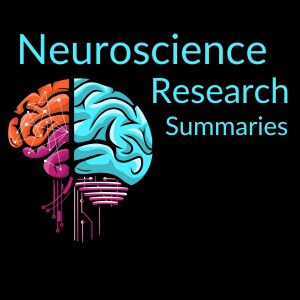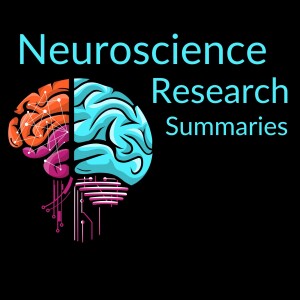Episodes

2 days ago
2 days ago
This study looked at whether eating meat is linked to dementia in older adults. The researchers used information from a large group of people in the UK Biobank and found that eating processed meat was associated with an increased risk of developing all-cause dementia and Alzheimer's disease. However, eating unprocessed red meat was associated with a lower risk. Eating poultry was not associated with dementia risk either way
The study was strong because it involved a very large group of people, so the results are statistically powerful.
However, there were some limitations, including the short follow-up period and the possibility that dementia could have already been developing in some participants before the study began.
It is important to remember that this is just one study, and more research is needed to confirm these results. However, the findings suggest that reducing your intake of processed meat may be a good idea for brain health
Studies:
https://www.sciencedirect.com/science/article/pii/S0002916522003173
https://ajcn.nutrition.org/article/S0002-9165(22)00297-0/fulltext
This podcast was made with Notebook LM by Google, curated by me, Danielle Vincent: https://instagram.com/theinevitabledanielle

4 days ago
4 days ago
My favorite floss: https://cocofloss.com/ (not an affiliate link, just a fan)
Summary:
Hepatitis C and herpes simplex virus 2 infections make you more likely to develop dementia. Many people have been infected with these viruses, making them important risk factors for dementia.
Having many infections over your lifetime plus gum disease with certain bacteria increases your risk of Alzheimer's disease.
Having a lot of infections plus a specific type of gum disease makes racial minorities more likely to get dementia.
Serious gum disease can make you more likely to get dementia, but this is mainly true if you haven't had a lot of other infections in your life. This might be because gum disease is a bigger problem for people with weaker immune systems.
People with tetanus antibodies are more likely to get Alzheimer's disease. This might be because people who get the tetanus vaccine are also more likely to see a doctor regularly, which means Alzheimer's might be diagnosed more often
The original research: https://pubmed.ncbi.nlm.nih.gov/39115027/
This is made with Google LM Notebook, which evaluates the study and creates a chatty podcast to describe it.
you can reach me on Instagram at https://instagram.com/theinevitabledanielle

4 days ago
4 days ago
Original study: https://www.nejm.org/doi/full/10.1056/NEJMoa1215740
This study looked at a large group of people, some with diabetes and some without, to see if there was a link between their blood sugar levels and their risk of developing dementia.
They found that people with higher blood sugar levels, even those without diabetes, were more likely to develop dementia over time.
It seems like even slightly elevated blood sugar could be harmful to the brain.
This means that keeping blood sugar levels in check is really important, even for people who don't have diabetes, to help protect against dementia.
This podcast was made by Google LM Notebook, curated by me, Danielle Vincent
You can find me here: https://instagram.com/theinevitabledanielle

4 days ago
4 days ago
This scoping review, titled "Diet and Anxiety: A Scoping Review," summarizes the current scientific literature on the relationship between diet and anxiety. It analyzes numerous studies, both human and animal, to assess how various dietary factors, such as the intake of specific nutrients, dietary patterns, and the gut microbiome, impact anxiety symptoms and disorder prevalence. The review also identifies knowledge gaps and areas for further research within this growing field of nutritional psychiatry.
Enjoy this research study: https://advances.nutrition.org/article/S2161-8313(22)00637-8/fulltext
This was made with Google LM
You can reach me at Instagram: https://instagram.com/theinevitabledanielle

Sunday Nov 10, 2024
Sunday Nov 10, 2024
Research report: https://www.thelancet.com/journals/landig/article/PIIS2589-7500(21)00275-2/fulltext
Research summarized by Google's Notebook LM
You can find me at https://instagram.com/theinevitabledanielle

Sunday Nov 10, 2024
Sunday Nov 10, 2024
Research is here: https://pmc.ncbi.nlm.nih.gov/articles/PMC1448497/
This is an AI-generated podcast that summarizes research studies about neuroscience. It is generated with Google LM.
You can find me at //instagram.com/theinevitabledanielle

Sunday Nov 10, 2024
Sunday Nov 10, 2024
Here's the research: https://link.springer.com/article/10.1007/s11187-018-0061-1
This is an AI-generated podcast that summarizes research studies about neuroscience. It is generated with Google LM.
You can find me at //instagram.com/theinevitabledanielle

Sunday Nov 10, 2024
Sunday Nov 10, 2024
Here's the research: https://pubmed.ncbi.nlm.nih.gov/39199177/
This is an AI-generated podcast that summarizes research studies about neuroscience. It is generated with Google LM.
You can find me at https://instagram.com/theinevitabledanielle

Wednesday Oct 30, 2024
Wednesday Oct 30, 2024
Information from the NIH as presented by Google's Notebook LM
find the original article here: https://www.nia.nih.gov/health/alzheimers-causes-and-risk-factors/what-happens-brain-alzheimers-disease
You can find me at https://instagram.com/theinevitabledanielle

Wednesday Oct 30, 2024
Wednesday Oct 30, 2024
A recap of the most recent study from The Lancet Commission on dementia prevention research: https://www.thelancet.com/commissions/dementia-prevention-intervention-care?dgcid=tlcom_infographic_demetia-risks-24_lancet
This podcast was made with Notebook LM
You can find me at https://instagram.com/theinevitabledanielle

The Neuroscience Research Summaries podcast brings you accessible summaries of recent neuroscience research, with a focus on dementia, ADHD, and mental health. Each episode breaks down complex studies into concise insights, with added context to help you understand their relevance to everyday life and mental health challenges. Created using Google Notebook LM, and curated by Danielle Vincent, this podcast aims to bridge the gap between cutting-edge research and listeners who are curious about the brain’s impact on well-being.
About Danielle Vincent:
Danielle Vincent is an entrepreneur and neuroscience enthusiast, known as the CEO of Outlaw, a personal care brand with a cult following. In addition to leading Outlaw, Danielle is the creator of May B., an SMS-based, AI-powered conversational support tool designed to keep users motivated and aligned with their personal goals. With a passion for understanding and applying science, Danielle started Neuroscience Research Summaries to share the latest findings in brain health, dementia, ADHD, and mental well-being in a straightforward, listener-friendly way.








